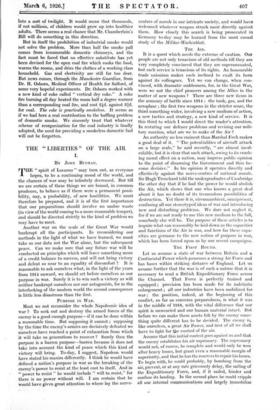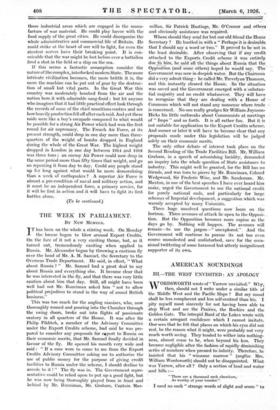THE " LIBERTIES " OF THE AIR
I.
BY JOHN BUCHAN. THE" spirit of Locamo " may turn out, as everyone hopes, to be a continuing mood of the world, and the chances of war may be infinitely decreased. But till we are certain of these things we are bound, in common prudence, to behave as if there were a permanent possi- bility, nay, a probability, of new hostilities. We must therefore be ,prepared, and it is of the first importance that our preparations should involve no undue waste (in view of the world coming to a more reasonable temper), and should be directed strictly to the kind of problem we may have to meet.
Another war on the scale of the Great War would bankrupt all the participants. In reconsidering our methods in the light of what we have learned, we must take as our data not the War alone, but the subsequent peace. Can we make sure that any future war will be conducted on principles which will leave something more of a credit balance to success, and will not bring victory and defeat so near to an equality of discomfort ? It is reasonable to ask ourselves what, in the light of the years from 1914 onward, we should set before ourselves as our purpose in war. Surely it is to win such a victory as will neither bankrupt ourselves nor our antagonists, for in the interlocking of the modern world the second consequence is little less disastrous than the first.
PURPOSE IN WAR.
Must we not reconsider the whole Napoleonic idea of war ? To seek out and destroy the armed forces of the enemy is a good enough purpose—if it can be done within a reasonable time. But supposing it cannot ; supposing by the time the enemy's armies are decisively defeated we ourselves have reached a point of exhaustion from which it will take us generations to recover. ? Surely then the purpose is a barren purpose—barren because it does not take into account the kind of peace which this kind of victory will bring. To-day, I suggest, Napoleon would have stated his maxim differently. I think he would have defined a nation's purpose in war as the breaking of the enemy's power to resist at the least cost to itself. And in " power to resist " he would include ".will to -resist," for there is no power without will. - I, am certain that he would have given great attention to where lay the nerve- centres of morale in our intricate society, and would have welcomed whatever weapon struck most directly against them. How closely this search is being 'prosecuted in Germany to-day may be learned from the most casual study of the Militar-Wochenblatt.
THE AIR.
It is a quest which needs the extreme of caution. Our people are not only tenacious of old methods till they are very completely convinced that they are superannuated, but each service is tenacious of its rights. An honourable trade unionism makes each inclined to exalt its horn against its colleagues. Yet we can change, when con- vinced, with dramatic suddenness, for, in the Great War, were we not the chief pioneers among the Allies in the matter of new weapons ? There are three new items in the armoury of battle since 1914: the tank, gas, and the aeroplane ; the first two weapons in the stricter sense, the third something wider, involving a new medium of action, a new tactics and strategy, a new kind of service. It is this third to which I 'would direct the reader's attention. In restating our defence problems and revising our mili- tary maxims, what are we to make of the Air ?
An authority no less eminent than Marshal Foch makes a good deal of it. " The potentialities of aircraft attack on a large scale," he said recently, " are almost incal- culable, but it is clear that such attack, owing to its crush- ing moral effect on a nation, may impress public opinion to the point of disarming the Government and thus be- come decisive." In his opinion it operates directly and effectively against the nerve-centres of national morale. Sir Hugh Trenchard told the undergraduates of Cambridge the other day that if he had the power he would abolish the Air, which shows that one who knows a great deal about it has no doubt of its tremendous possibilities of destruction. Yet there it is, circumarnbient, omnipresent, confusing all our stereotyped ideas of war and introducing new and disturbing problems. We dare not neglect it, for if we are not ready to use this new medium to the full, somebody else will be. The purpose of these articles is to inquire what can reasonably be laid down as the capacities and functions of the Air in war, and how far these capa- cities are germane to the new notion of purpose in war, which has been forced upon us by our recent campaigns.
THE FIRST ROUND.
Let us assume a state of war between Britain and a Continental Power which possesses a strong Air Force and has bases within striking distance of England. Let us assume further that the war is of such a nature that it is necessary to send a British Expeditionary Force across the Channel. That Force is perfectly trained and equipped ; provision has been made for its indefinite enlargement ; all our industries have been mobilized for war ; the position, indeed, at the beginning of this conflict, so far as concerns preparedness, is what it was in the middle of 1918, with the vital difference that our spirit is unwearied and our human material intact. But before we can make these assets felt by the enemy some- thing quite different has to be decided. The enemy is, like ourselves, a great Air Power, and first of all we shall have to fight for the control of the air.
Assume that this initial contest goes against us and that the enemy establishes his air supremacy. The supremacy would not, of course, be complete and would only be won after heavy losses, but grant even a reasonable margin of superiority, and that he has the reserves to repair his losses. To begin with, he could probably, by bombing from the air, prevent, or at any rate grievously delay, the sailing of the Expeditionary Force, and, if it sailed, hinder and confuse its landing. In the second place he could cripple all our internal communications and largely immobilize those industrial areas which are engaged in the manu- facture of war material. - He could play havoc with the food supply of the great cities. He could disorganize the whole administrative and commercial life of Britain. He could strike at the heart of our will to fight, for even the stoutest nerves have their breaking point. It is con- ceivable that the war might be lost before ever a battalion fired a shot in the field or a ship on the sea.
If this seems a fantastic assumption consider the nature of the complex, interlocked modern State. The more intricate civilization becomes, the more brittle it is, the more the machine can be. put out of gear by the destruc- tion of small but vital parts. In the Great War this country was moderately bombed from the air and the nation bore it with admirable sang-froid ; but let anyone who imagines that it had little practical effect look through the records of some of the chief munitions centres and see how heavily-production fell off after each raid. And yet these raids were like a boy's escapade compared to what would be possible for a strong Aix Power which had won the first round, for air supremacy. The French Air. Force, at its present strength, conk' drop in one day more than three, quarters of the .weight of bombs dropped. in England during the whole of the Great War. The highest weight dropped in London in one day between 1914. and 1918 was three tons ; an enemy Air Power could now drop in the same period more than fifty times that weight, and go on repeating it from day to day. Could any people stand up for long against what would be more demoralizing than a week of earthquakes ? A superior Air Force is almost a pre-condition of naval and military action, and it must be an independent force, a primary service, for it will .be first_in, action and it will have to fight its first battles alone.
(To be continued.)







































































 Previous page
Previous page